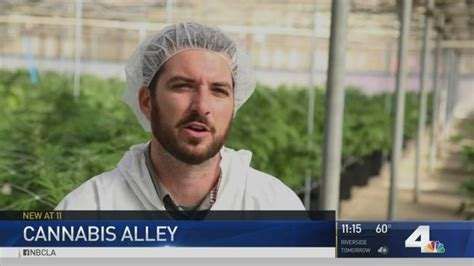Under new state law, cannabis cultivators are banned from building new greenhouses unless they are built in the footprint of old ones, which are “getting a second life,” according to a greenhouse manager.
California’s Salinas Valley is referred to as the “salad bowl of the nation,” best described in iconic pages when John Steinbeck, American author and son of the Monterey County community, put pen to paper in most of his classic writings.
It’s here in this region of sprawling fields about 100 miles south of San Francisco where Japanese immigrants found their American dream after World War II in the cut flowers business, evident even today.
“A lot of these houses are Japanese-style houses,” said Alicia, a cannabis properties realtor.
With California’s law legalizing marijuana poised to go into effect next year, Salinas enters a new chapter in its agricultural history. It could become the cannabis capital of the state.
Alicia agreed to show us around the valley on the condition we don’t share her last name. She specializes in the new green that’s growing here, pointing out farms she says are now cannabis farms.
“Look. Barbed wires, cameras,” she said.
Alicia works to sell, buy or manage what used to be properties housing the booming flower market, properties that have since fallen apart due to various free trade agreements over the years.
She says ever since California legalized marijuana, there’s new life breathing into the valley and sucking dry the idea of continuing with the cut flowers business, when owners can sell their properties for millions.
“It wouldn’t make sense to grow flowers, you know, at $5 million,” she said.
Under new California law, cannabis cultivators are banned from building new greenhouses, unless they are built in the footprint of old ones. So any “green” house in the state has the potential to evolve into a “grow” house.
“California cannabis is its own brand, no different than California wine or anything else,” Michael Williamson, the director of operations at Harborside, a leading cannabis grower and distributor in Northern California.
He says his hairnet, white jumpsuit and gloves are a way to keep the product pure and free from human interaction.
“When you look at our product and our plants, it’s really not that different than a lot of the cut flowers market,” he said. “Which makes this valley kind of the potential to be the Sonoma Valley of cannabis.”
Williamson wouldn’t say how much Harborside makes on its product, adding that for now, it’s grown solely for medical purposes.
He said the company is eyeing Los Angeles for what’s to come.
“Our moral compass is always the same,” he said. “We want to create a safe, consistent and hopefully potent cannabis.”
Growers in Monterey County say they take pride in more than just their product, but also what the industry is doing for the local workforce: the general contractors, green house manufacturers, security companies, fence installers, security camera installers and providers.
“We feel that cannabis could be a $1 billion crop within the next 24 months in Monterey County,” said Mike Bitar, the cofounder of Grupo Flor, a company that’s been actively seeking out empty greenhouses to manage. “These greenhouses are getting a second life. Right now there are no empty greenhouses in Monterey County. They’ve all either been leased up or purchased in the last six months.”
The numbers are already massive.
According to Arcview market research, a company specializing in the marijuana market, California accounted for 31 percent of the legal cannabis market in the U.S. last year. Locally that’s only for medical use. Compare that with Colorado at 19 percent and Washington at 11 percent, where marijuana is legal for recreational use.
“This industry has grown by leaps and bounds,” said Daniel Yi, a spokesman for Medmen, a cannabis management and investment firm based in Los Angeles. The company has a cultivation site in Sun Valley and also runs a dispensary in West Hollywood.
“LA plays a huge role in terms of what we’ve learned over 20 years of regulation, what we’ve learned in techniques and cultivation. We have a lot of experience and a lot of demand,” he said.
Yi says research is showing as states legalize marijuana for recreational use, more and more users are opting against the flowery buds for smoking and turning to products that come from extracting the oils from pot plants.
“There are edibles, there are extracts, there are vape pens,” he said.
And with much of the state’s demand coming from LA, it leaves the smaller towns up north with dreams of what that could do for them.
“It’ll be a pretty phenomenal crop going to LA, I’m sure, because their numbers are big,” said Salinas Mayor Joe Gunter, adding his city is actively working to become a model for others in how to regulate the industry.
“We have to embrace it because it’s coming.”
For many, though, it’s been here for decades.
“Our industry has been testing cannabis, has been labeling cannabis and has been concerned to consumer safety long before the California legislature woke to this monster,” said Salinas attorney Gavin Kogan who made cannabis law a specialty.
But there’s one thing that’s keeping cannabis from growing greener across the country: the stigma of the drug the feds still say is illegal.
“We’re chipping away at it,” Yi said.
Michael is now the Cheif Operating Officer of Catalyst BC and has consulted on numerious cannabis cultivation facilities.
Source: NBC Los Angeles By John Cádiz Klemack
Additional Resources
Consulting Services For Cannabis, Hemp, Psilocybin, and Natural Medicine
- Consulting Services Overview
- Business Strategy
- Financial Planning
- Cannabis, Hemp, Psilocybin, & Natural Medicine Licensing and Applications
- Facility Design
- StartUp Support
- Genetic Development
- Business Turnaround
- Operational Optimization
- Vertical Farming
- Controlled Environmental Agriculture (CEA)
- State and Country Services Directory
- Blog
- Home
Testimonials and Public Relations
Latest Articles
- Missouri Cannabis Licensing & Business Opportunities 2026Missouri has established itself as the premier success story for cannabis in the Midwest, evolving from a standard medical regime to a high-volume adult-use market that exceeded $1.52 billion in annual sales in 2025. As the market enters the 2026–2027 biennium, the landscape is shifting from rapid expansion toward operational maturation and specialized entry.
- North Carolina Cannabis Licensing & Business Opportunities 2026North Carolina remains one of the final significant jurisdictions in the United States without a comprehensive medical or adult-use cannabis program. However, the 2026–2027 biennium is projected to be the most consequential period in the state’s cannabis history. Driven by the formation of the North Carolina Advisory Council on Cannabis and an impending federal “hemp cliff,” the state is moving from a period of passive prohibition toward a structured, albeit highly restrictive, regulatory framework.
- Nebraska Cannabis Licensing & Business Opportunities 2026Nebraska is entering the 2026–2027 biennium at a historic crossroads. Following the 71% voter approval of Initiatives 437 and 438 in late 2024—the largest margin for a medical cannabis initiative in U.S. history—the state is currently standing up its first regulated medical infrastructure.
- Florida Cannabis Licensing & Business Opportunities 2026Florida represents the most capital-intensive and professionally structured cannabis market in the nation. As of 2026, the state is at a crossroads: it is both expanding its mature medical program and preparing for a potential constitutional shift toward universal adult-use access. On November 3, 2026, Florida voters will decide on the Marijuana Legalization Initiative (Amendment 3). Passing this requires a 60% supermajority—a high threshold, but one that polls suggest is within reach.
- Virginia Cannabis Licensing & Business Opportunities 2026As Virginia transitions from its current “possession-only” model toward a fully regulated retail market, the 2026–2027 biennium represents a once-in-a-generation window for market entry. Unlike the vertically integrated “medical-only” regimes of the past, Virginia’s upcoming framework focuses on decentralization, specifically architected to favor small Virginia-based operators over large multi-state corporations.
- Minnesota Cannabis Licensing & Business Opportunities 2026Minnesota is currently undergoing a transformative shift in its cannabis landscape, moving from a semi-regulated hemp-derived market toward a fully comprehensive adult-use framework. Overseen by the Office of Cannabis Management (OCM), the 2026–2027 biennium represents the critical “enforcement phase” where temporary registrations sunset and permanent, merit-based licenses define the market’s long-term leaders.
Explore Our Articles
cannabis applications Cannabis Bar Cannabis Business Optmization cannabis careers Cannabis Compliance Cannabis Consumption Cannabis Consumption Bar Cannabis Inventory Management Systems Cannabis Investors cannabis jobs Cannabis Legalization cannabis licensing Cannabis Lounge cannabis marketing Cannabis Operational Procedures cannabis outreach Cannabis Regulations Cannabis Security Cannabis Software Cannabis Startup Cannabis Supply Chain Cannabis Technology Colorado controlled environment agriculture Cultivation cultivation facility Dispensary Design facility design Financial Planning HVAC HVACD Iowa Kansas Legal Update Legislation Medical Cannabis Minnesota Natural Medicine Nebraska New York Odor Control Oregon Psilocybin Psychedelics Recreational Cannabis
Free Ebook – Start Your Own Legal Cannabis Business








